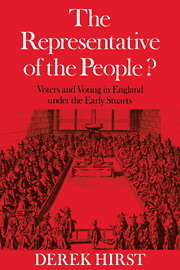6 - Control and independence in voting
Published online by Cambridge University Press: 15 December 2009
Summary
The effectiveness of political education depended upon the intensity of the electoral experience gained. Had placid electors been merely trooped out to vote by their lords, then their acquisition of any sense of what a political act was would have been minimal, for they would have taken no independent initiative, and nor would they have had to think. Our task is to attempt to discover the extent to which unhindered choice on the part of the voters was possible. To conclude that many people were capable of voting, or even that many did vote, does not say much about the character of the democracy then prevailing. Recent or present-day regimes have boasted universal suffrage and 98 per cent turn-outs, and yet we would hesitate to call them democratic, by virtue of certain habits they display of channelling the popular will. Were that the case in the 17th century, the fact that a surprisingly large number of people could have voted, or sometimes did vote, would have been of little more than academic significance. We must determine the opportunities for genuine self-expression, and also the forms that self-expression took, in order to establish whether there was any wider political awareness at the lowest levels of the process. There certainly was such awareness at Westminster, more so as 1642 approached; but Westminster was not necessarily the mirror of England. If there had been an effective representative system, it should to some degree have been so.
Municipal politics, despite the efforts of magistrates and Stuart monarchs, provided a real training for many people.
- Type
- Chapter
- Information
- The Representative of the People?Voters and Voting in England under the Early Stuarts, pp. 109 - 131Publisher: Cambridge University PressPrint publication year: 1975



